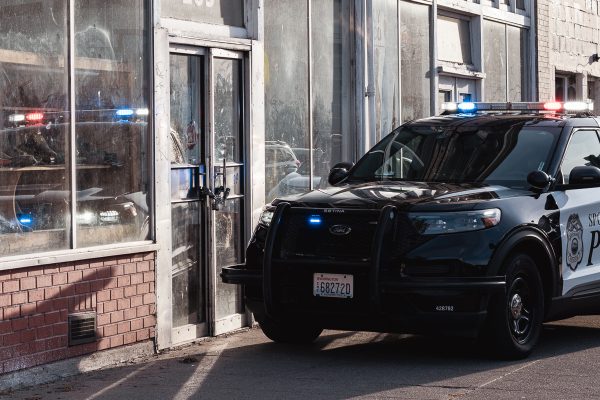Pentagon report conveys victims’ voices
June 5, 2014
The U.S. Department of Defense announced on May 1 that military members who reported a sexual assault while serving leaped 50 percent in the 2013 report compared to the previous year, proving that many victims are speaking out.
Defense Secretary Chuck Hagel made a point in a news conference at the Pentagon on May 1 that male and female members of the military that are victims of sexual assault while in uniform is unacceptable and the Pentagon must do more to fight a culture that discourages victims to report an assault.
“We have to fight the cultural stigmas that discourage reporting and be clear that sexual assault does not occur because a victim is weak, but rather because an offender disregards our values and the law,” Hagel said.
According to key findings in the DOD’s Annual Report on Sexual Assault in the Military, the DOD received 5,061 reports of alleged sexual assault involving one or more service members as either the victim or suspect – a 50 percent increase over the 3,374 reports received in 2012.
Since 2006, the average annual increase in reports of sexual assault has been approximately five percent, until now.
David Millet, director of Eastern’s Veteran’s Resource Center, offers veteran awareness training for the campus community through a program titled “Got Your 6.” Millet served on active duty in the U.S. Army for 25 years after retiring in 2009.
According to Millet, “got your six” means “got your back” in military jargon.
“‘Got Your 6’ … [educates] staff, faculty and students on military culture, VA educational benefits and student veteran challenges on campus,” said Millet in an email. “It helps make EWU a more military and veteran supportive campus, and creates a climate of understanding for our veterans.”
According to Millet, since the VRC opened in July 2012, over 700 faculty, staff and students have received “Got Your 6” training.
In the “Got Your 6” training, military sexual trauma, or MST, is defined as “sexual assault, sexual threats, bullying and unwanted touching or grabbing that occurred while in the military.” Sexual assault, defined by the military, can be from unwanted sexual contact to rape.
Lieutenant Colonel Jason Pape, Eastern ROTC department chair and professor of military science, said one of his main focuses right now is teaching the ROTC students about sexual harassment and assault.
“Like the military, universities are dealing with many of the same issues related to sexual harassment and sexual assault. Our ROTC program is half male and half female, a much more equal representation than the military. That gives us a great platform to confront these issues head-on, as a team called Army ROTC, but also as part of EWU,” said Pape.
Stigmas and stereotypes surrounding military leaders who endure sexual assaults personify the culture of not reporting them, especially within the idea of strength while serving. This holds true with men who are victims of sexual assault while in uniform and decide not to report to the chain of command due to questioning of sexual orientation and being seen as weak.
With women, a majority of their claims regarding a sexual assault get blatantly ignored or they fear retribution, as seen in the documentary film, “The Invisible War,” which is about sexual assaults in the U.S. military.
Recent estimated numbers by Department of Defense officials convey that about 14,000 men have been sexually assaulted in the military compared to about 12,000 women, as seen in anonymous surveys given out by the military.
Therefore, the Pentagon is pushing to persuade servicemen to report their assaults more, as well as servicewomen.
In light of the report, Veteran’s Affairs Secretary Eric Shinseki resigned on May 30 after concerns arose surrounding the agency’s health care system for veteran’s, specifically at a VA hospital in Phoenix.
According to the Associated Press, employees at the VA hospital were keeping a secret waiting list, as well as suggestions that up to 40 patients may have died while awaiting care, along with found falsification of appointment records in Phoenix and other locations, as probed by a VA inspector.
The VA and members of Congress have been well aware of these concerns throughout various documents and outside organizations for years, according to records and the Associated Press.
The care and well-being of veteran’s health, whether mentally or physically, through the VA and DOD has been diminishing over the years.
These recent sexual assault statistics from the DOD do not prove that sexual assaults have increased this past fiscal year. It only portrays that victims reporting sexual assaults are increasing.
Mike Hantho, a sophomore majoring in journalism with a minor in communications studies and military science, has been in the ROTC program at EWU since spring of 2013. He said that the increase in reports could be a sign that victims and their supporters are more aware of their situations and are able to effectively act against sexual misconduct, as well as its perpetrators.
“Usually for situations that are reported, there are many more that are not reported. This means that the total amount of incidences of sexual misconduct that do occur is not fully known,” said Hantho in an email. “However, with more awareness being promoted in the military about this subject, it’s likely that the number of reports will increase, as the number of actual incidences that occur will decrease over time.”
With awareness and proactive changes comes an understanding of the voices that are being heard, and the voices that are wanting to be heard against sexaul assault in the military.
“All the services are making efforts to both prevent sexual assault in the military, refine the processes to punish those who commit the assault, and provide services for those who face MST,” said Millet.
Hantho said that despite these statistics, he still views the Army as an excellent institution immersed with diversity within knowledge, experience, gender and race.
“Sexual trauma is an issue that is not exclusive to the military, but is something that affects other workplaces, and our society as a whole,” said Hantho. “The Army — and the military as a whole — is just an extension of our society in terms of values and beliefs, and to truly deal with sexual trauma, we must also examine our culture and question what we believe is acceptable or not.”
For more information on the Veteran’s Resource Center at EWU, visit their website.







![Simmons said the biggest reasons for her success this year were “God, hard work, and trusting [her] coach and what she has planned.”](https://theeasterner.org/wp-content/uploads/2024/05/image1-1-1200x800.jpg)


![Simmons said the biggest reasons for her success this year were “God, hard work, and trusting [her] coach and what she has planned.”](https://theeasterner.org/wp-content/uploads/2024/05/image1-1-600x400.jpg)






